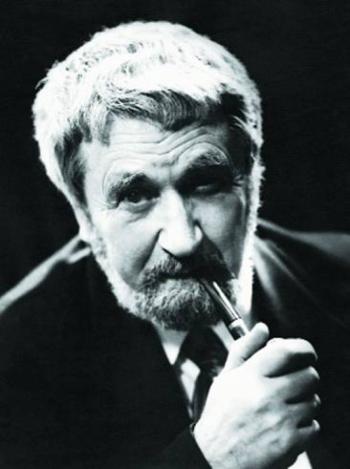The author and playwright Isay Kuznetsov was born in 1916 in Petrograd (present-day St. Petersburg) in a religious family. His great-grandfather had been a cantonist who served for 25 years in the Czarist army, but never converted to Christianity. Later, as a military veteran, he was allowed to live outside the Pale of Settlement with his family, and settled in Tula. Isay Kuznetsov's parents were born there. His father worked for a timber trading company. Due to his job, the Kuznetsov family moved first to Petrograd, and then to Moscow. Even under Soviet rule, the family observed Jewish traditions, and the children read the Torah and studied Hebrew.
In 1931, Isay Kuznetsov completed a 7-year school in Moscow and began to attend the Factory School of the Moscow Electric Plant. There, he joined an amateur theater, which eventually became a professional one. In 1937, Isay's father was arrested on the false charge of being a Polish spy. Fortunately, this arrest did not affect Isay's academic prospects, and he was not expelled from his school.
Through his activities at the Workers' Youth Theater, Isay Kuznetsov struck up a close friendship with Zinoviy Gerdt, who would go on to become a famous actor. The shows staged by this theater were directed by Valentin Pluchek, who would later serve as permanent director of the Moscow Satire Theater. In 1939, Valentin Pluchek and Alexei Arbuzov established a drama school that came to be known as the "Arbuzov School", and Kuznetsov and Gerdt joined it. In collaboration with the poets Alexander Galich and Vsevolod Bagritsky, they wrote a play titled The Duel, which was not staged due to the outbreak of war. Following the Nazi invasion of the USSR in late June 1941, the "Arbuzov School" fell apart. Most of its actors and actresses were called up for military service, while the school itself was transformed into a front-line theater.
Isay Kuznetsov was sent to the Saratov Oblast, to a school that quickly trained specialists for the engineering corps. In 1943, he was dispatched to the Leningrad Front. Kuznetsov went on to serve in a pontoon bridge brigade until the end of the war, assisting in the ferrying of troops and heavy military equipment across rivers, bays, and channels. In those years, First Sergeant Kuznetsov was awarded the Order of the Red Star, as well as medals. His wife and both of his brothers died in the war.
After the end of the war, Kuznetsov returned to Moscow, where, at Valentin Pluchek's suggestion, he resumed his theatrical career, working as an assistant director at a traveling theater However, Kuznetsov was fired in 1949, during the "anti-cosmopolitan" campaign. After the end of this antisemitic campaign, Kuznetsov teamed up with the journalist Avenir Zak, and the two went on to write more than ten plays and movie scripts, which were staged in the country's leading theaters and served as the basis of cult films. Their fruitful partnership lasted until the death of Avenir Zak in 1976.
In subsequent years (until 2000), Kuznetsov was one of the heads of the screenwriting department of the Gerasimov Institute of Cinematography.
Isay Kuznetsov died in Moscow in 2010.
2015 saw the publication of Isay Kuznetsov's posthumous autobiography, which was titled Once upon a Time in the War.







